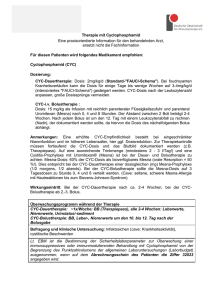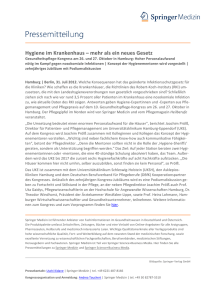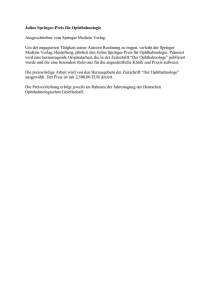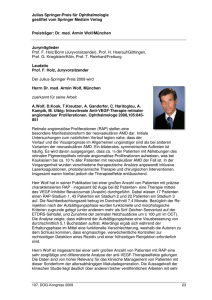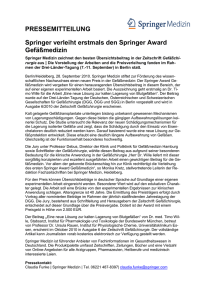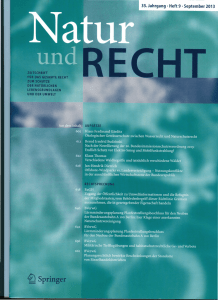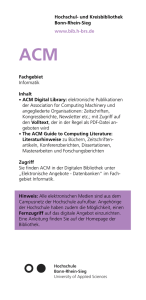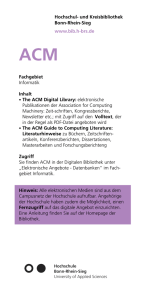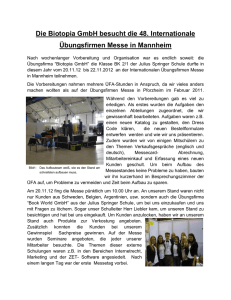184.127 - 2.0 SE Grundlagen methodischen Arbeitens — Artificial
Werbung
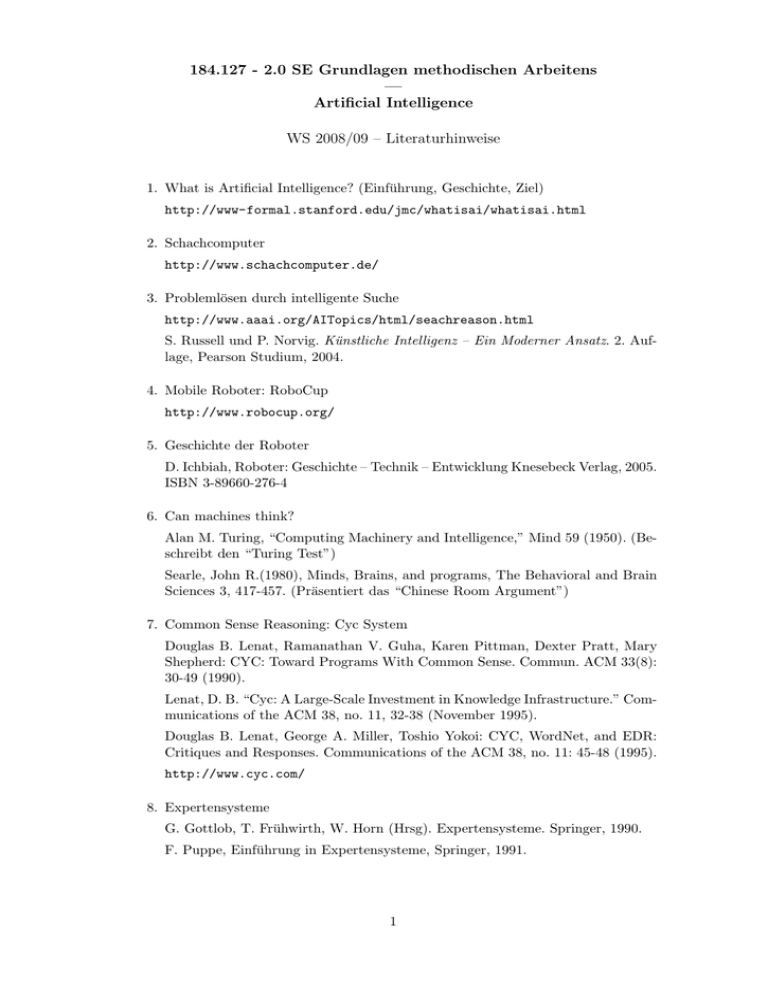
184.127 - 2.0 SE Grundlagen methodischen Arbeitens — Artificial Intelligence WS 2008/09 – Literaturhinweise 1. What is Artificial Intelligence? (Einführung, Geschichte, Ziel) http://www-formal.stanford.edu/jmc/whatisai/whatisai.html 2. Schachcomputer http://www.schachcomputer.de/ 3. Problemlösen durch intelligente Suche http://www.aaai.org/AITopics/html/seachreason.html S. Russell und P. Norvig. Künstliche Intelligenz – Ein Moderner Ansatz. 2. Auflage, Pearson Studium, 2004. 4. Mobile Roboter: RoboCup http://www.robocup.org/ 5. Geschichte der Roboter D. Ichbiah, Roboter: Geschichte – Technik – Entwicklung Knesebeck Verlag, 2005. ISBN 3-89660-276-4 6. Can machines think? Alan M. Turing, “Computing Machinery and Intelligence,” Mind 59 (1950). (Beschreibt den “Turing Test”) Searle, John R.(1980), Minds, Brains, and programs, The Behavioral and Brain Sciences 3, 417-457. (Präsentiert das “Chinese Room Argument”) 7. Common Sense Reasoning: Cyc System Douglas B. Lenat, Ramanathan V. Guha, Karen Pittman, Dexter Pratt, Mary Shepherd: CYC: Toward Programs With Common Sense. Commun. ACM 33(8): 30-49 (1990). Lenat, D. B. “Cyc: A Large-Scale Investment in Knowledge Infrastructure.” Communications of the ACM 38, no. 11, 32-38 (November 1995). Douglas B. Lenat, George A. Miller, Toshio Yokoi: CYC, WordNet, and EDR: Critiques and Responses. Communications of the ACM 38, no. 11: 45-48 (1995). http://www.cyc.com/ 8. Expertensysteme G. Gottlob, T. Frühwirth, W. Horn (Hrsg). Expertensysteme. Springer, 1990. F. Puppe, Einführung in Expertensysteme, Springer, 1991. 1 9. Odyssey 2001 – Der HAL Supercomputer Stork, D.G., editor, HAL’s Legacy – 2001’s Computer as Dream and Reality, MIT Press, 1997. Am Institut verfügbar 10. Spracherkennung Cole et al., Survey of the State of the Art in Human Language Technology, Cambridge University Press and Giardini, 1997. J. N. Holmes, Sprachsynthese- und Spracherkennung, 1991, Oldenbourg Verlag Hermann Ney: Maschinelle Sprachverarbeitung Der statistische Ansatz bei Spracherkennung und Sprachbersetzung. Informatik Spektrum 26(2): 94-102 (2003) Stephan Euler: Grundkurs Spracherkennung. Vieweg Verlag, 2006. ISBN 3-83480003-1 11. ELIZA als Beispiel eines Dialogsystems Weizenbaum, J. (1965): ELIZA - A Computer Program for the Study of Natural Language Communication Between Man and Machine. Comm. ACM(1):36-45. Weizenbaum, J. (1978): Die Macht der Computer und die Ohnmacht der Vernunft. Frankfurt/Main: Suhrkamp. [Orginalausgabe 1976 bei W.H. Freeman & Co. unter dem Titel Computer Power and Human Reason. From Judgement to Calculation] 12. Neuronale Netze (neural networks) Rojas, Raùl: Theorie der neuronalen Netze. Eine systematische Einfhrung; Springer Verlag Berlin Heidelberg New York, 1993. Kinnebrock, Werner: Neuronale Netze : Grundlagen, Anwendungen, Beispiele / von Werner Kinnebrock. - Mnchen ; Wien : Oldenbourg, 1992. 13. Bilderkennung und -verstehen Jahne, B., Massen, R., Nickolay, B., and Scharfenberg, H. (1996). Technische Bildverarbeitung – Maschinelles Sehen. Springer, Berlin. 14. Artificial Life Christoph Adami. Introduction to Artificial Life. Springer, 1998 K. Sims. Evolving Virtual Creatures, Computer Graphics (Siggraph ’94 Proceedings), July 1994, pp.15-22. 15. AI & Computer Games http://ai.eecs.umich.edu/people/laird/gamesresearch.html 16. AI & Semantic Web http://www.w3.org/2001/sw/, http://www.w3.org/2006/Talks/0718-aaai-tbl/ Overview.html#(1), AAAI Conference 2007 2 17. Machine Learning – Überblick T. Mitchell: Machine Learning. McGraw Hill, New York, 1997. S. Russell und P. Norvig. Künstliche Intelligenz – Ein Moderner Ansatz. 2. Auflage, Pearson Studium, 2004. 18. AI Planning – Überblick Daniel S. Weld: Recent Advances in AI Planning. AI Magazine 20(2): 93-123 (1999) M. Ghallab, D. Nau, P. Traverso: Automated Planning: Theory and Practice. Morgan Kaufmann, 2004. ISBN 1-55860-856-7 S. Russell und P. Norvig. Künstliche Intelligenz – Ein Moderner Ansatz. 2. Auflage, Pearson Studium, 2004. 19. Intelligent Software Agents Michael Wooldridge: Intelligent Agents: The Key Concepts. Multi-Agent-Systems and Applications 2001: 3-43, http://link.springer.de/link/service/series/ 0558/bibs/2322/23220003.htm Jennings, Nicholas R.; Wooldridge, Michael J.: Applications of Intelligent Agents. In: Jennings, Nicholas R.; Wooldridge, Michael J. (Hrsg.): Agent Technology. Foundations, Applications, and Markets; Springer Verlag Berlin Heidelberg New York, 1998. S. Russell und P. Norvig. Künstliche Intelligenz – Ein Moderner Ansatz. 2. Auflage, Pearson Studium, 2004. 20. Wissensrepräsentation – Überblick Brachman R, Levesque H, eds., Readings in Knowledge Representation, Los Altos: Morgan Kaufman. 1985. R. J. Brachman, H. J. Levesque: Knowledge Representation and Reasoning. Morgan Kaufmann, 2004. 21. Logik und AI http://plato.stanford.edu/entries/logic-ai/ 22. AI Tools and Languages (Programmiersprachen, Shells, etc) http://www.aaai.org/AITopics/html/sys.html, http://www.aaai.org/AITopics/html/soft.html 23. Constraint Satisfaction 24. Web / Data Mining Soumen Chakrabarti: Mining the Web - Discovering Knowledge from Hypertext Data. Morgan Kaufmann Publishers, 2003. 3
